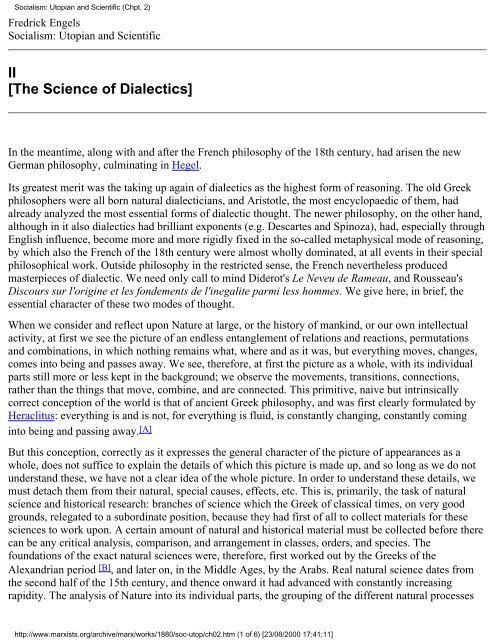Socialism: Utopian and Scientific - MIA
Socialism: Utopian and Scientific - MIA
Socialism: Utopian and Scientific - MIA
Create successful ePaper yourself
Turn your PDF publications into a flip-book with our unique Google optimized e-Paper software.
<strong>Socialism</strong>: <strong>Utopian</strong> <strong>and</strong> <strong>Scientific</strong> (Chpt. 2)Fredrick Engels<strong>Socialism</strong>: <strong>Utopian</strong> <strong>and</strong> <strong>Scientific</strong>II[The Science of Dialectics]In the meantime, along with <strong>and</strong> after the French philosophy of the 18th century, had arisen the newGerman philosophy, culminating in Hegel.Its greatest merit was the taking up again of dialectics as the highest form of reasoning. The old Greekphilosophers were all born natural dialecticians, <strong>and</strong> Aristotle, the most encyclopaedic of them, hadalready analyzed the most essential forms of dialectic thought. The newer philosophy, on the other h<strong>and</strong>,although in it also dialectics had brilliant exponents (e.g. Descartes <strong>and</strong> Spinoza), had, especially throughEnglish influence, become more <strong>and</strong> more rigidly fixed in the so-called metaphysical mode of reasoning,by which also the French of the 18th century were almost wholly dominated, at all events in their specialphilosophical work. Outside philosophy in the restricted sense, the French nevertheless producedmasterpieces of dialectic. We need only call to mind Diderot's Le Neveu de Rameau, <strong>and</strong> Rousseau'sDiscours sur l'origine et les fondements de l'inegalite parmi less hommes. We give here, in brief, theessential character of these two modes of thought.When we consider <strong>and</strong> reflect upon Nature at large, or the history of mankind, or our own intellectualactivity, at first we see the picture of an endless entanglement of relations <strong>and</strong> reactions, permutations<strong>and</strong> combinations, in which nothing remains what, where <strong>and</strong> as it was, but everything moves, changes,comes into being <strong>and</strong> passes away. We see, therefore, at first the picture as a whole, with its individualparts still more or less kept in the background; we observe the movements, transitions, connections,rather than the things that move, combine, <strong>and</strong> are connected. This primitive, naive but intrinsicallycorrect conception of the world is that of ancient Greek philosophy, <strong>and</strong> was first clearly formulated byHeraclitus: everything is <strong>and</strong> is not, for everything is fluid, is constantly changing, constantly cominginto being <strong>and</strong> passing away. [A]But this conception, correctly as it expresses the general character of the picture of appearances as awhole, does not suffice to explain the details of which this picture is made up, <strong>and</strong> so long as we do notunderst<strong>and</strong> these, we have not a clear idea of the whole picture. In order to underst<strong>and</strong> these details, wemust detach them from their natural, special causes, effects, etc. This is, primarily, the task of naturalscience <strong>and</strong> historical research: branches of science which the Greek of classical times, on very goodgrounds, relegated to a subordinate position, because they had first of all to collect materials for thesesciences to work upon. A certain amount of natural <strong>and</strong> historical material must be collected before therecan be any critical analysis, comparison, <strong>and</strong> arrangement in classes, orders, <strong>and</strong> species. Thefoundations of the exact natural sciences were, therefore, first worked out by the Greeks of theAlex<strong>and</strong>rian period [B] , <strong>and</strong> later on, in the Middle Ages, by the Arabs. Real natural science dates fromthe second half of the 15th century, <strong>and</strong> thence onward it had advanced with constantly increasingrapidity. The analysis of Nature into its individual parts, the grouping of the different natural processeshttp://www.marxists.org/archive/marx/works/1880/soc-utop/ch02.htm (1 of 6) [23/08/2000 17:41:11]














![tyf Enf=O=n]lgg](https://img.yumpu.com/47584932/1/190x245/tyf-enfonlgg.jpg?quality=85)

